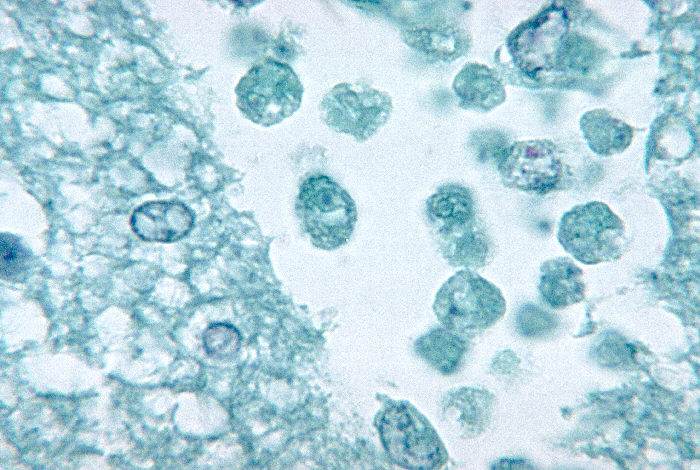As the weather warms up, Western Australians are being reminded to ensure they take precautions to protect themselves and their families from a potentially fatal infection.
Amoebic meningitis is a rare but fatal infection caused by the Naegleria fowleri amoeba which lives in fresh water and damp soil. When water containing active amoebae enters the nose, the amoebae travel to the brain causing inflammation and destruction of brain tissue.
Department of Health Environmental Health Water Unit Manager Richard Theobald said it was important people were aware of the risk and ensured water that they or their children were playing in was properly treated and maintained.
“In addition to pools and spas, children often cool down in water from garden hoses or sprinklers, wading pools, and on regional properties, dams and lakes,” he said.

Image/CDC
“As amoebae thrive in water temperatures between 28˚C and 40˚C, it should be assumed that any warm fresh water potentially contains the Naegleria fowleri amoeba.
“The infection can affect people at any age; however children and young adults are usually more susceptible to the infection due to their recreational water use and activities.”
Although there has not been a case of amoebic meningitis in Western Australia since the 1980s, Mr Theobald warned people not to become complacent about the infection.
“The Naegleria fowleri amoeba is naturally occurring in the environment and cannot be eradicated,” he said.
“This means that the risk of contracting this infection is always real, and precautions must always be taken. Even with treatment amoebic meningitis is usually fatal – prevention is vital.”
Mr Theobald said that pool and spa owners should closely monitor and check chlorine levels are within a safe range (external site).
“It is also important that wading pool water is changed after each use as this water provides the perfect environment for the amoeba to grow,” he said.
“Similarly, people swimming in dams or playing with garden hoses or sprinklers (regardless of water source) also need to be vigilant and ensure no water from these sources enters the nose.”
Mr Theobald said the risk of amoebic meningitis could be reduced by taking some simple precautions including:
- never allow water to go up your nose or a child’s nose and do not sniff water into your nose when bathing, showering or washing your face
- run all water from any hose or sprinkler for a few minutes until cool water flows through the hose before letting any child play with water from a hose or sprinkler
- always supervise children playing with hoses or sprinklers and teach them not to squirt water up their noses
- if the water in a hose or sprinkler remains warm even after flushing for a few minutes, do not let children play with it
- disinfect your swimming pool water with chlorine – chlorine is the most effective way to continually disinfect water as it kills all stages of the amoeba
- keep wading pools clean by emptying, scrubbing and allowing them to dry in the sun after each use
- do not jump or dive into water – walk or lower yourself in
- swim in and play with safe (disinfected) water only
- stay out of dirty pools, waterholes, dams, swimming pools or spas
- swim in sea water or chlorinated pools rather than fresh water
- do not dig or stir up sediment
- let bath and shower taps run for a few minutes to flush out the pipes
- do not use tap water for nasal irrigation unless it has been further treated.


One thought on “Brain-eating amoeba precautions issued in W. Australia as weather warms”